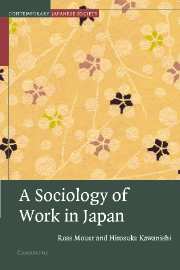Book contents
- Frontmatter
- Contents
- List of figures
- List of tables
- Preface
- Note on transliteration, romanization, and translation
- List of abbreviations
- Part I A context for studying work
- Part II The commitment to being at work
- Part III Processing labor through Japan's labor markets
- Part IV The broader social policy context for understanding choice at work in Japan
- 7 From labor policy to social policy: a framework for understanding labor process in Japan at the national level
- 8 Social security and safety nets
- Part V The power relations shaping the organization of work in Japan
- Part VI The future
- References
- Author index
- General index
7 - From labor policy to social policy: a framework for understanding labor process in Japan at the national level
Published online by Cambridge University Press: 03 December 2009
- Frontmatter
- Contents
- List of figures
- List of tables
- Preface
- Note on transliteration, romanization, and translation
- List of abbreviations
- Part I A context for studying work
- Part II The commitment to being at work
- Part III Processing labor through Japan's labor markets
- Part IV The broader social policy context for understanding choice at work in Japan
- 7 From labor policy to social policy: a framework for understanding labor process in Japan at the national level
- 8 Social security and safety nets
- Part V The power relations shaping the organization of work in Japan
- Part VI The future
- References
- Author index
- General index
Summary
All the people are equal under the law and there shall be no discrimination in political, economic or social relations because of race, creed, sex, social status or family origin
(Article 14 of the Japanese Constitution).Every person shall have freedom to choose … his occupation to the extent that it does not interfere with the public welfare
(Article 22 of the Constitution).All people shall have the right to maintain the minimum standards of wholesome and cultured living
(Article 25 of the Constitution).All people shall have the right to receive an equal education correspondent to their ability, as provided by law
(Article 26 of the Constitution).All people shall have the right and the obligation to work
(Article 27 of the Constitution).The right to own or to hold property is inviolable
(Article 29 of the Constitution).Approaching labor policy in Japan
The labor markets described in the preceding two chapters are embedded within a larger sociopolitical context. These passages from the Japanese Constitution provide a broad framework for work-related legislation in postwar Japan. Government policy continues to influence in numerous ways the social context in which Japan's labor markets function. In some areas, however, the policy framework has been characterized by conspicuous non-involvement. The government's indifference to horrendous pollution in the late 1960s and the early 1970s is one example. Others might be its reluctance to address various issues related to karoshi and illness from overwork. In other areas the government has been criticized for being over-zealous.
- Type
- Chapter
- Information
- A Sociology of Work in Japan , pp. 145 - 177Publisher: Cambridge University PressPrint publication year: 2005

